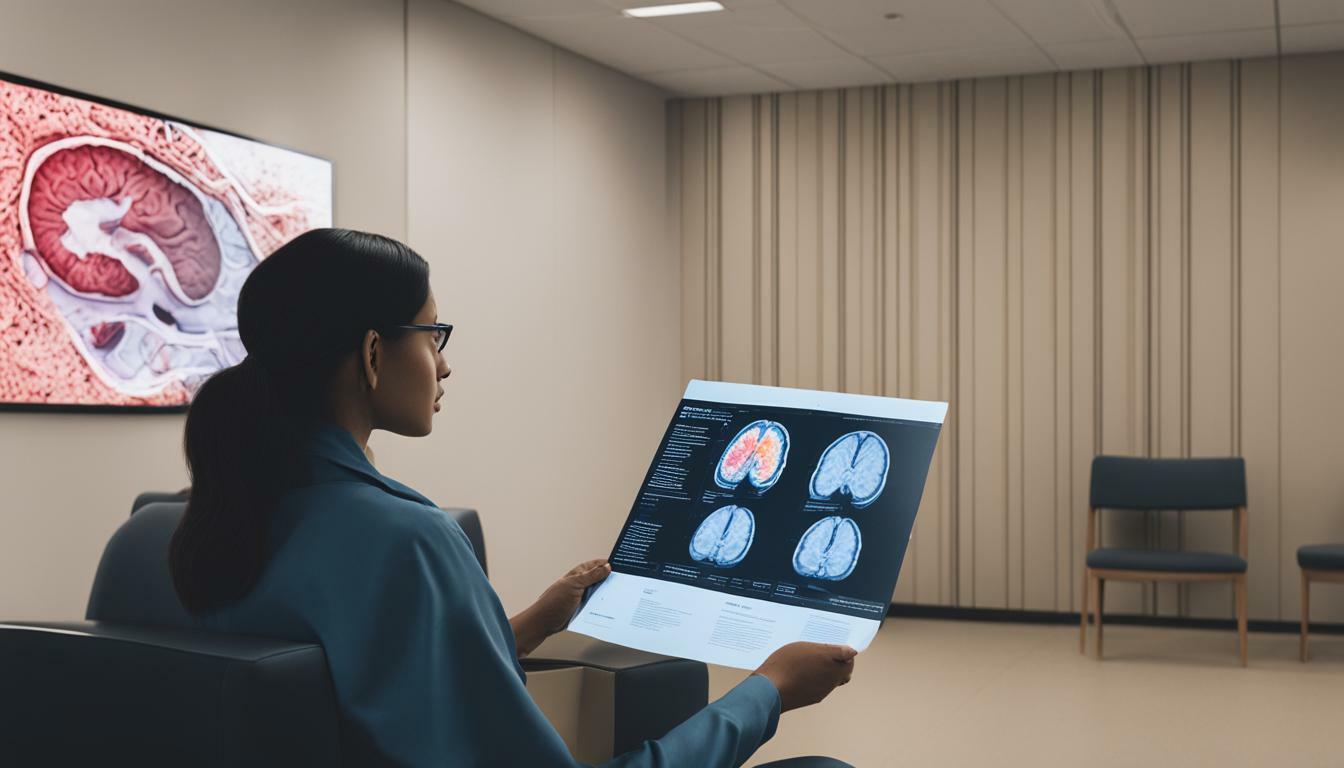As a professional copywriting journalist, I understand the importance of mental health and its impact on our overall well-being. If you or someone you know is struggling with mental health issues, getting a brain scan can provide valuable insights into potential abnormalities or irregularities that may be contributing to the condition. In this comprehensive guide, I will walk you through the process of obtaining a brain scan for mental health issues.
Key Takeaways:
- Getting a brain scan is an important step in understanding and treating mental health conditions.
- A mental health professional can determine if a brain scan is necessary.
- A referral to a neuroimaging facility is required to undergo a brain scan.
- Preparing for the brain scan is essential, which may include avoiding certain foods or medications.
- Undergoing a brain scan is non-invasive and painless and can provide valuable insights into your mental health.
The Significance of Brain Scans for Mental Health
As someone who has struggled with mental health issues, I understand how overwhelming it can be to navigate the complex world of mental health treatment. That’s why I want to emphasize the importance of brain scans as a tool for diagnosing and treating mental illnesses.
Brain scans provide insight into the neurological functioning and structure of the brain, allowing healthcare professionals to identify potential abnormalities or irregularities that may be contributing to mental health conditions. This information is crucial for developing a personalized treatment plan and ensuring the best possible outcome for patients.
There are several types of brain scans that may be used to diagnose mental health conditions, including magnetic resonance imaging (MRI) and computed tomography (CT) scans. These scans are non-invasive and painless, making them a safe and effective way to gather valuable information about the brain.
The Significance of Brain Scans for Mental Health Conditions
Depression: Brain scans have shown that individuals with depression may have decreased activity in certain areas of the brain, such as the prefrontal cortex and amygdala. By identifying these abnormalities, healthcare professionals can tailor treatment to target these areas and promote healing.
Anxiety Disorders: In individuals with anxiety disorders, brain scans may reveal excessive activity in the amygdala, which plays a key role in the body’s stress response. By identifying this overactivity, healthcare professionals can develop coping strategies and relaxation techniques to help individuals manage their anxiety more effectively.
Schizophrenia: Brain scans have revealed differences in the structure of the brains of individuals with schizophrenia, including enlarged ventricles and decreased volume in certain areas of the brain. By identifying these abnormalities, healthcare professionals can develop treatment plans that address these specific differences and improve outcomes for patients.
In conclusion, brain scans are a valuable tool for diagnosing and treating mental health conditions. By understanding the significance of these scans, individuals can work with healthcare professionals to develop a personalized treatment plan that targets specific areas of the brain and promotes healing.
Consulting with a Mental Health Professional
Before getting a brain scan for mental health issues, it’s crucial to consult with a mental health professional. As a journalist who has covered mental health extensively, I know that this step is essential in determining if a brain scan is necessary. A psychiatrist, psychologist, or another qualified mental health provider can evaluate your symptoms and determine if a brain scan is necessary to diagnose or treat a mental illness.
During this initial consultation, the mental health professional will ask you questions about your history, symptoms, and overall mental health. They will also evaluate your behavior and mental state through various tests and observations. Based on their assessment, they can determine if a brain scan is warranted.
If your mental health professional determines that a brain scan is necessary, they will provide you with a referral to a neuroimaging facility. This referral is necessary as you cannot go to a neuroimaging facility yourself since these facilities require a doctor’s order for the scan.
Referral to a Neuroimaging Facility
After consulting with a mental health professional, they may determine that a brain scan is necessary to diagnose and treat your mental health issues. If this is the case, your mental health provider will provide you with a referral to a neuroimaging facility. These facilities are equipped with specialized imaging technologies, such as MRI or CT scans, which can capture detailed images of the brain.
It’s important to note that not all insurance providers cover the cost of brain scans for mental health purposes. Be sure to check with your insurance provider before scheduling your appointment to determine if the cost will be covered. If it’s not covered, you may need to pay out of pocket, which can be expensive.
Once you have the referral, you can contact the neuroimaging facility to schedule your appointment. You’ll likely be asked to provide your insurance information, so be sure to have it on hand.
Scheduling and Preparing for the Brain Scan
Once you have the referral for a brain scan for mental health issues, it’s time to schedule your appointment. The neuroimaging facility will guide you through the process and provide you with the necessary instructions on how to prepare for the scan.
It’s essential to follow the instructions provided to you by the facility to ensure accurate results. This may include avoiding certain foods or medications, removing metal objects, and wearing suitable clothing.
| Things to consider when preparing for a brain scan: |
|---|
| 1. Avoid caffeine or other stimulants before the scan, as they may interfere with the accuracy of the results. |
| 2. Remove any metal objects, including jewelry or hairpins, as these can interfere with the imaging technology. |
| 3. Wear comfortable clothing without any metal buttons or zippers, which can also affect the images captured during the scan. |
| 4. Inform the facility if you have any medical implants, such as pacemakers, as these can be affected by the magnetic fields used in MRI scans. |
Following these instructions will ensure that your brain scan is conducted efficiently and accurately. It’s normal to feel anxious or nervous about the procedure, but the healthcare professionals at the facility will guide you through the process with care and professionalism.
Final Thoughts
Preparing for a brain scan is an essential step in the process of obtaining a diagnosis for mental health conditions. By following the instructions provided by the neuroimaging facility, you can ensure that the scan is carried out accurately and that the results provide valuable insights into your condition. Remember, getting a brain scan is a proactive step towards better mental health, and it can contribute to your overall care and treatment plan.
Undergoing the Brain Scan and Next Steps
Now that you’ve scheduled your appointment, it’s time to prepare for your brain scan. You may be asked to fast for a period before the scan or avoid certain medications, so be sure to follow the instructions given to you by the neuroimaging facility. It’s also important to wear comfortable clothing without any metal objects, so the scan can be performed accurately.
When you arrive at the facility for your scan, a trained professional will guide you through the process. You will be asked to lie down on a table, and the imaging equipment will be positioned around your head. During the scan, it’s essential to remain still so that clear, accurate images can be obtained. The scan itself is painless and typically lasts between 30-60 minutes, depending on the type of scan you are having.
After your scan is complete, a radiologist or other medical expert will analyze the images and create a report. This report will be sent to your mental health professional, who will interpret the results and discuss them with you. Depending on the findings, your mental health professional may recommend additional testing or treatment options.
It’s important to remember that a brain scan is just one tool in the diagnosis and treatment of mental health conditions. Your mental health professional will use the information gathered from the scan, along with other assessments and evaluations, to develop a comprehensive treatment plan tailored to your specific needs.
If you have any concerns or questions about the brain scan process, don’t hesitate to ask your mental health professional or the staff at the neuroimaging facility. They are there to help you and ensure that you have a comfortable, informative experience.
Taking the First Step towards Better Mental Health
Getting a brain scan for a mental health condition can be a nerve-wracking experience, but it’s an important step towards understanding your symptoms and receiving the proper treatment. I know firsthand how daunting it can be to take that first step, but I encourage you to be brave and take control of your mental well-being.
Remember that a brain scan is just one of many tools that healthcare professionals use to diagnose and treat mental health conditions, and it’s a crucial step in building a comprehensive treatment plan. By undergoing a brain scan, you are gathering valuable information that can help your mental health provider craft a plan tailored to your specific needs.
If you’re feeling hesitant or unsure, I encourage you to reach out to a mental health professional. They can help answer any questions you may have about the process and guide you through each step. Remember that taking care of your mental health is just as important as taking care of your physical health, and seeking treatment is a sign of strength and self-care.
Conclusion
Obtaining a brain scan for a mental health condition can be a powerful tool in your journey towards better mental health. By consulting with a mental health professional, obtaining a referral to a neuroimaging facility, and undergoing the scan, you are taking control of your mental well-being and embarking on a path towards recovery.
Remember that everyone’s journey towards recovery is unique, and a brain scan is just one part of a comprehensive treatment plan. But by taking that first step and seeking help, you’re already making progress towards a healthier, happier you.
FAQ
Q: Why are brain scans important for mental health?
A: Brain scans provide valuable insights into the neurological functioning and structure of the brain, helping healthcare professionals identify potential abnormalities or irregularities that may be contributing to mental health conditions.
Q: How do I get a brain scan for mental health?
A: The first step is to consult with a mental health professional who can assess your symptoms and determine if a brain scan is necessary. If it is, they will provide you with a referral to a neuroimaging facility.
Q: What can I expect during a brain scan?
A: Brain scans are non-invasive and painless. You will be guided through the process by trained professionals, and it’s important to remain still during the procedure to obtain accurate results.
Q: How do I prepare for a brain scan?
A: The neuroimaging facility will provide instructions on how to prepare for the scan. This may include avoiding certain foods or medications, removing metal objects, and wearing suitable clothing.
Q: What happens after the brain scan?
A: The images will be analyzed by a radiologist or other medical experts, who will provide a report to your mental health professional for interpretation. This information will contribute to your overall care and treatment plan.
Q: How does a brain scan contribute to my mental health recovery?
A: By obtaining a brain scan, you are taking a proactive approach to understanding and treating your mental health condition. The scan can provide valuable insights that contribute to your overall care and help guide treatment options.





